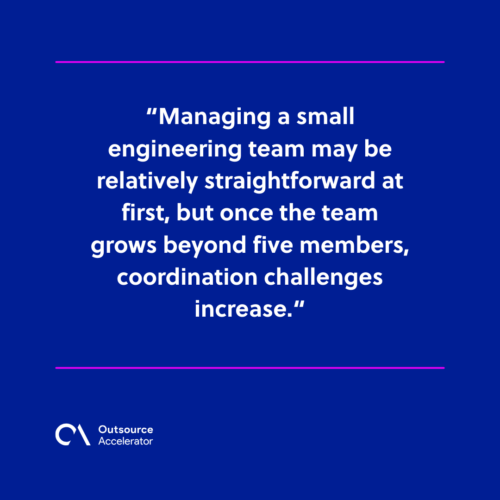Why your business needs an engineer manager (and when to hire one)

Building and scaling a business today is about executing a vision with technical know-how and the ability to turn complex ideas into tangible results.
For businesses in the engineering field or industries reliant on technical teams, the importance of seamless operations cannot be overstated. As technology plays a bigger role in every industry, businesses face a hard truth: Great ideas alone won’t cut it.
While developers are skilled at building products and providing solutions to complex problems, they are not always prepared to manage the broader responsibilities of running efficient operations.
This is exactly where an engineer manager steps in.
This blog will guide you through the importance of having an engineering manager and how to recognize the right time to bring this key role into your business.
What is an engineer manager?
An engineer manager is responsible for bridging the gap between senior management and the engineering team, ensuring that technical execution aligns with overall business goals.
This professional is especially needed in industries such as manufacturing, software development, construction, or any field relying heavily on engineering expertise.
Engineer managers hold responsibility for team performance, cross-functional collaboration, and strategic planning within the engineering function.

Additionally, their role extends to the following initiatives:
- People management
- Performance evaluations
- Long-term workforce planning
How does an engineer manager help a business?
Without clear direction, engineering teams can easily drift toward projects that don’t deliver real value. An engineer manager plays a critical role in making sure technical work stays aligned with business goals.
One of the most significant benefits of having this professional on the team is improved operational efficiency.
Rather than allowing processes to become outdated or inefficient, the engineer manager actively assesses and refines workflows to ensure the team operates at peak performance. This means less technical debt, faster workflows, and fewer wasted efforts.
Other ways they make this happen include:
- Setting up standard processes for development, testing, and deployment
- Cleaning up or improving old workflows that slow the team down
- Encouraging best practices that protect the quality of the final product
Further, engineer managers help teams stay focused, hit deadlines, and meet high standards. They improve communication between departments, making sure that even non-technical teams are in sync with how engineers operate.
4 Traits to look for in an engineer manager
Selecting a qualified engineer manager requires evaluating both technical knowledge and leadership capability. The following traits are essential:
1, Effective leader
A business needs an engineer manager who is an effective leader capable of aligning technical teams with organizational goals.
This professional should be able to guide teams with professionalism and clarity. This includes establishing clear objectives, setting expectations, and providing constructive feedback.
2. Business-minded
An engineer manager needs to be business-minded to ensure technical efforts contribute meaningfully to company success.
A business-minded professional evaluates technical options through the lens of cost, time, and strategic impact. Engineer managers should be able to do work initiatives that drive value, manage budgets carefully, and align engineering output with the company’s long-term goals.
If an engineer manager can bridge the gap between technical execution and business strategy, this professional can help maximize return on investment and support sustainable growth.
3. Technically proficient
Technical competence is non-negotiable for an engineer manager who needs to make informed decisions that affect the business.
A technically competent engineer manager earns the trust of the engineering department and the whole organization, leading to better execution, fewer missteps, and faster adaptation to changes in the market.
4. Conflict-resilient
An engineer manager must be conflict-resilient to maintain team productivity and protect project outcomes.
If engineer managers can address disagreements early and manage discussions objectively, they can also guide the team toward a practical resolution without allowing issues to escalate.
For businesses, this trait is essential to maintaining operational efficiency, safeguarding team morale, and avoiding the hidden costs associated with unresolved tensions.
When to hire an engineer manager
Certain business conditions indicate the need to introduce an engineer manager. Delaying this decision may result in operational inefficiencies and hindered growth.
The following scenarios are clear indicators that it’s time to add this leadership role.
Team size exceeds five engineers
Managing a small engineering team may be relatively straightforward at first, but once the team grows beyond five members, coordination challenges increase.
Without dedicated leadership, communication becomes fragmented, project timelines slip, and accountability weakens.
An engineer manager brings structured workload distribution, enforces consistent processes, and provides centralized oversight.

Product development increases in complexity
As a company’s product evolves, it often accumulates additional features, system integrations, and technical dependencies. With increased complexity, the risks of unstable performance rise.
An engineer manager plays a vital role in balancing immediate product demands with long-term stability and ensuring that engineering standards are maintained.
Moreover, this leader safeguards the business from escalating maintenance costs and future reworks that can become significantly more expensive and disruptive if left unmanaged.
Operations expand across departments
Expansion across multiple departments, locations, or even remote work arrangements can strain internal communication and operational consistency. Different teams may interpret priorities differently, leading to delays, duplicated efforts, or missed objectives.
You need an engineer manager to streamline communication, standardize engineering processes, and ensure that distributed teams stay aligned with the company’s overall strategy.
Lead your team through growth with an engineer manager
Without the right leadership in place, engineering teams may struggle with communication, project coordination, and meeting business objectives.
By appointing an engineer manager at the right time, engineering businesses can ensure that technical teams remain aligned with the company’s long-term goals.







 Independent
Independent




